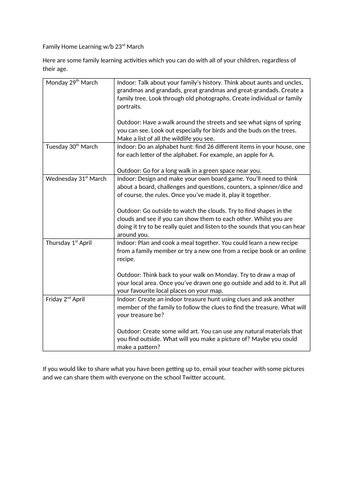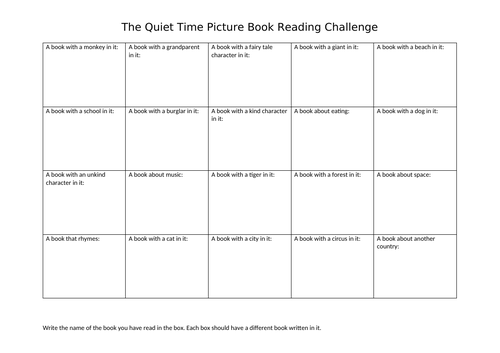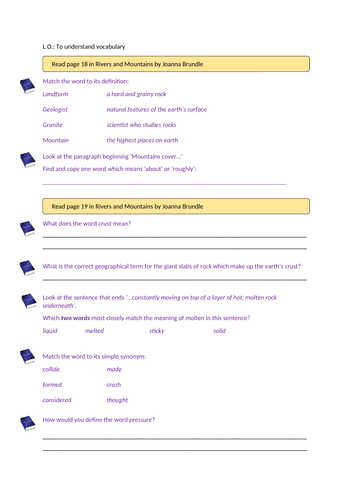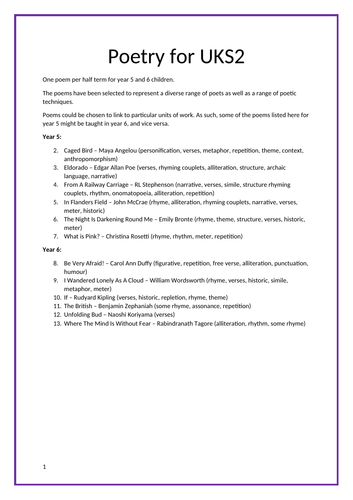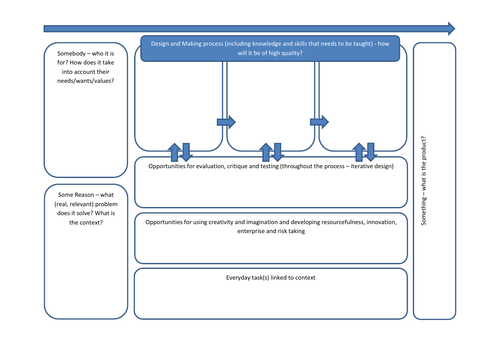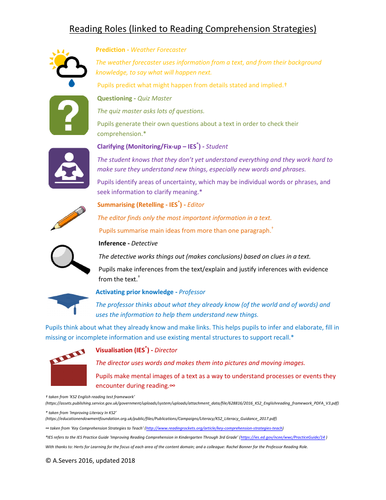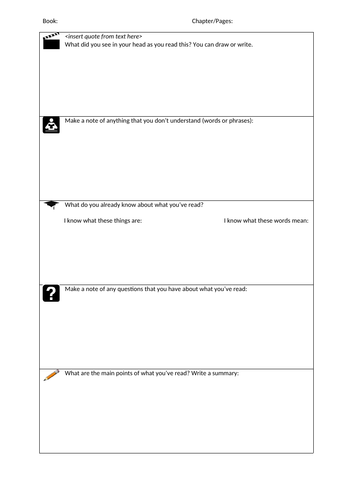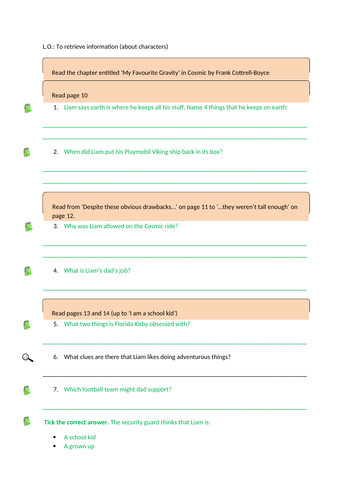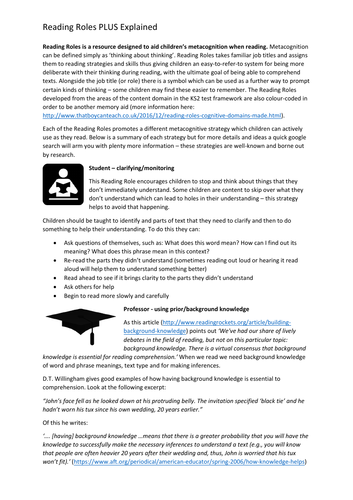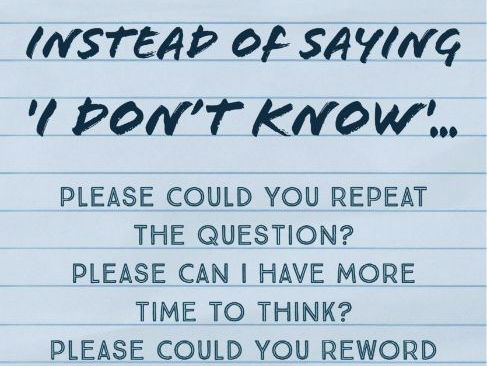
71Uploads
396k+Views
946k+Downloads
All resources

Indoor and Outdoor Family Learning Daily Challenges
As part of the work we are suggesting to our families during the lockdown, we are sending a daily idea for a task that can be completed by children of all ages by family groups.
We wanted to reduce the number of different tasks that a family was asked to do and so created these daily ideas for less academic, more creative activities.
They are mostly collated from various resources on the web so most of the ideas are nothing new but they are all together, mapped out in one place.
They are dated (beginning 23rd March) so you can either amend the dates, or join in at the relevant date.

Picture Book Reading Challenges
2 simple grids with 20 different things per grid to find in picture books
2 more simple grids containing alphabet challenges

Mountains Reading Comprehension Activities
Linked to Reading Roles (https://www.tes.com/teaching-resource/reading-roles-a-way-to-help-children-remember-the-areas-of-the-content-domain-ks1-and-ks2-11416334)
Based on the following books/poems:
Habitat Survival: Mountains by Melanie Waldron
Everest by Sangma Francis
Rivers and Mountains by Joanna Brundle
Asha and the Spirit Bird by Jasbinder Bilan
Unfolding Bud by Naoshi Koriyama

Mixed Number Improper Fraction Conversion Questions
A set of questions for converting mixed number fractions to improper fractions and vice versa.
Also includes a scaffolded version with area models for shading.

Learning Sequence (Backwards) Planning Document
A simple document to guide the thinking process behind planning a learning sequence.
One of the Word documents included in the download features comments on each part of the planning proforma which can act as a guide to use.
Included also is an exemplified version based on a year 3 reading/poetry objective.

Castle Texts - poems and account of a siege (KS2)
The siege account provides two parallel accounts - one from someone inside the castle defending it, one from someone outside attacking.
One poem is by Alexander Anderson and has lots of great descriptive and figurative language to describe castles.
The other poem is by me and looks at a castle in three time periods - in a time of peace, in a time of conflict and in the modern day.

UKS2 Poetry Booklet
One poem per half term for year 5 and 6 children.
The poems have been selected to represent a diverse range of poets as well as a range of poetic techniques.
Poems could be chosen to link to particular units of work. As such, some of the poems listed here for year 5 might be taught in year 6, and vice versa.
Year 5:
Caged Bird – Maya Angelou (personification, verses, metaphor, repetition, theme, context, anthropomorphism)
Eldorado – Edgar Allan Poe (verses, rhyming couplets, alliteration, structure, archaic language, narrative)
From A Railway Carriage – RL Stephenson (narrative, verses, simile, structure rhyming couplets, rhythm, onomatopoeia, alliteration, repetition)
In Flanders Field – John McCrae (rhyme, alliteration, rhyming couplets, narrative, verses, meter, historic)
The Night Is Darkening Round Me – Emily Bronte (rhyme, theme, structure, verses, historic, meter)
What is Pink? – Christina Rosetti (rhyme, rhythm, meter, repetition)
Year 6:
Be Very Afraid! – Carol Ann Duffy (figurative, repetition, free verse, alliteration, punctuation, humour)
I Wandered Lonely As A Cloud – William Wordsworth (rhyme, verses, historic, simile, metaphor, meter)
If – Rudyard Kipling (verses, historic, repletion, rhyme, theme)
The British – Benjamin Zephaniah (some rhyme, assonance, repetition)
Unfolding Bud – Naoshi Koriyama (verses)
Where The Mind Is Without Fear – Rabindranath Tagore (alliteration, rhythm, some rhyme)

Editable numberline and column method word docs for addition and subtraction
Includes a sequence for teaching subtraction using numberlines and a sequence for teaching addition using column addition.

Planning Sheet for Primary Design and Technology Unit
This planning sheet takes into consideration the aims and purposes of the DT curriculum for KS1 and KS2. It does not focus on the individual objectives laid out but reminds teachers as they plan of the more fundamental things that the unit they are planning should address.

Reading Roles linked to Reading Comprehension Strategies
A slimmed down version of Reading Roles PLUS which focuses only on reading comprehension strategies.

Reading Roles PLUS Generic Reading Comprehension Activity (for use with any text)
Reading Roles PLUS Generic Reading Activity
The aim of this activity is to help children gain a better understanding of a text. It focuses on using 5 of the main widely-acknowledged reading strategies. Although the activity itself has a goal of enabling understanding of one text, the cumulative effect of doing several of these activities is intended to be that children begin to use these strategies automatically when they read any text.
For more on Reading Roles: https://www.tes.com/teaching-resource/reading-roles-plus-teaching-metacognitive-reading-comprehension-strategies-11890964 & http://www.thatboycanteach.co.uk/2018/04/reading-roles-metacognitive-reading-strategies.html

Charlie and the Chocolate Factory Chapters 3 - 11 Comprehension Questions
With various focuses on vocabulary and retrieving and inferring information, particularly about characters.
Colours/symbols linked to Reading Roles: https://www.tes.com/teaching-resource/reading-roles-plus-teaching-metacognitive-reading-comprehension-strategies-11890964

Cosmic by Frank Cottrell-Boyce Reading Comprehension
Reading comprehension questions for various chapters of Cosmic by Frank Cottrell-Boyce.
Focussing on character description, retrieval, vocabulary and inference.

Reading Roles PLUS: Teaching Metacognitive Reading Comprehension Strategies
Reading Roles PLUS is a resource designed to aid children’s metacognition when reading. Metacognition can be defined simply as ‘thinking about thinking’. Reading Roles PLUS takes familiar job titles and assigns them to reading strategies and skills thus giving children an easy-to-refer-to system for being more deliberate with their thinking during reading, with the ultimate goal of being able to comprehend texts. Alongside the job title (or role) there is a symbol which can be used as a further way to prompt certain kinds of thinking – some children may find these easier to remember.
Read more: www.thatboycanteach.co.uk/2018/04/reading-roles-metacognitive-reading-strategies.html

Crib sheet: Associative, Commutative and Distributive laws at primary level
A quick reference sheet for teachers to use outlining Associative, Commutative and Distributive laws and linking them to national curriculum statements.
Images courtesy of Richard Harvey Swanston, Primary Maths Lecturer at The University of Brighton ()
Created with reference to

Why You Might Be Getting Feedback Wrong! PowerPoint for staff training
A powerpoint version of these two blog posts: http://thatboycanteach.blogspot.com/2017/12/why-you-might-be-getting-feedback-wrong_15.html
This is a presentation about marking and is based on the EEF document:
https://educationendowmentfoundation.org.uk/public/files/Publications/EEF_Marking_Review_April_2016.pdf

Poster: What To Say Instead of I Don't Know
A poster to remind children of some alternatives to saying I don't know.
Also included is a Word file of the text.

Reading Comprehension Using Photo of Jewish and Muslim Protesters - Trump Muslim Ban
A comprehension activity based on a picture by Nuccio DiNuzzo taken at a US airport where protesters are protesting against Trump's Muslim ban.
The questions focus on inference and do depend on children having some background knowledge, i.e. of the Holocaust.

Mo Farah’s full statement on Trump ‘Muslim ban’ - Reading Comprehension
A quick reading comprehension in response to Donald Trump's 'Muslim Ban' in the US centred around Mo Farah's initial statement outlining his concerns about not being allowed back to the US.
This reading comprehension has colour-coded questions using my 'Reading Roles' which are based on the content domain areas for reading (download them here: https://www.tes.com/teaching-resource/-11416334).

The Battle of Thermopylae Comprehension Work
Focused on vocabulary and summarising texts
Linked to my Reading Roles (see my other TES resources)
Includes 4 different activities in a sequence
Questions are based on this text from The British Museum: http://www.ancientgreece.co.uk/war/story/sto_set.html

